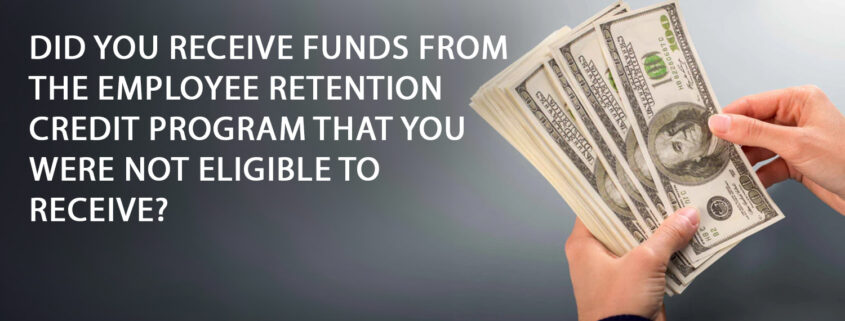Did You Receive Funds From The Employee Retention Credit Program That You Were Not Eligible To Receive?
Did You Receive Funds From The Employee Retention Credit Program That You Were Not Eligible To Receive?
Time is running out to participate in the Employee Retention Credit Voluntary Disclosure Program, which ends on March 22, 2024.
If you claimed and received funds from the Employee Retention Credit (“ERC”) Program and now realize that you were not entitled to receive those funds, you should consider entering into the Employee Retention Credit Voluntary Disclosure Program (“ERC-VDP”). The IRS believes that there are taxpayers who were lured by promoters to apply to the IRS to get funds from the ERC Program even though the promoters knew that the taxpayer did not qualify to get funds from the ERC Program. If such a taxpayer is selected for examination by the IRS and the IRS determines that the ERC claim is erroneous, such taxpayer will be required to repay the ERC funds with penalties and interest. Criminal prosecution is also possible where egregious circumstances and willful intent are present.
Criminal exposure and a reduced amount of payback is available by entering into ERC-VDP. The ERC-VDP allows filers of erroneous ERC claims to voluntarily disclose ERC claims made in error and pay only 80% of the amount received without any worry of criminal exposure. But the deadline to apply for ERC-VDP is quickly approaching – you only have through March 22, 2024 to apply.
Details Of ERC-VDP.
The program requires you to:
- Voluntarily pay back the ERC funds received, minus 20%,
- Cooperate with any requests from the IRS for more information, and
- Sign a closing agreement.
Benefits Of ERC-VDP.
There are several benefits to using the ERC-VDP if you received the ERC funds but were not entitled to them.
- You need to repay only 80% of the ERC funds you received as a credit on your return or as a refund.
- You do not need to repay any interest you received on your ERC refund.
- You do not have to amend income tax returns to reduce wage expense.
- The 20% retention of ERC funds is not taxable as income.
- The IRS will not charge penalties or interest on the claimed ERC amount if you pay it in full (claimed ERC minus 20%) by the time you return your signed closing agreement to IRS.
- The IRS will not examine ERC on your employment tax return for tax period(s) resolved within the terms of ERC-VDP.
Who can apply to the ERC-VDP.
Businesses, tax-exempt organizations, and government entities are eligible to apply for the ERC-VDP for each tax period that meets all the following requirements:
- Your ERC claimed on an employment tax return has been processed and paid as a refund, which you have cashed or deposited, or paid in the form of a credit applied to the tax period or another tax period.
- You now think that you were entitled to $0 ERC.
- You are not under employment tax examination (audit) by the IRS.
- You are not under criminal investigation by the IRS.
- The IRS has not reversed or notified you of intent to reverse your ERC to $0. For example, you received a letter or notice from the IRS disallowing your ERC.
If you used a third-party payer to file your employment tax returns or claim your ERC, you cannot apply to the ERC-VDP yourself. You must contact the third-party payer to apply. Also, if you have applied for ERC and have yet to receive the ERC funds, you cannot participate in ERC-VDP. Instead you would need to pursue the ERC claim withdrawal process.
How to apply to ERC Voluntary Disclosure Program.
The submission of Form 15434, Application for Employee Retention Credit Voluntary Disclosure Program, will start the process which must be filed no later than March 22, 2024. Additionally, if your application includes tax periods ending in 2020, you must include ERC-VDP Form SS-10. By utilizing qualified tax counsel, you should have the greatest likelihood of meeting the ERC-VDP requirements and thus securing all the program’s benefits.
What Should You Do?
We encourage taxpayers who are concerned about their ERC funding awards to come in voluntarily before the IRS commences any examination or investigation. By then, it will be too late to avoid the risk of returning all ERC funds awarded plus interest and penalties.
Let the tax attorneys of the Law Offices Of Jeffrey B. Kahn, P.C. located in Orange County (Irvine), San Diego County (Carlsbad) and elsewhere in California can help you with your ERC-VDP application, give advice about this process, or advice on the ERC. You know that at the Law Offices Of Jeffrey B. Kahn, P.C. we are always thinking of ways that our clients can save on taxes. Tax problems are usually a serious matter and must be handled appropriately so it is important to that you have hired the best lawyer for your situation. We are experts in handling tax matters and can effectively represent at all levels with the IRS and State Tax Agencies including criminal tax investigations and attempted prosecutions, undisclosed foreign bank accounts and other foreign assets, and unreported foreign income. Also, if you are involved in cannabis, check out what a cannabis tax attorney can do for you. And if you are involved in crypto currency, check out what a bitcoin tax attorney can do for you.


 Follow
Follow Follow
Follow
